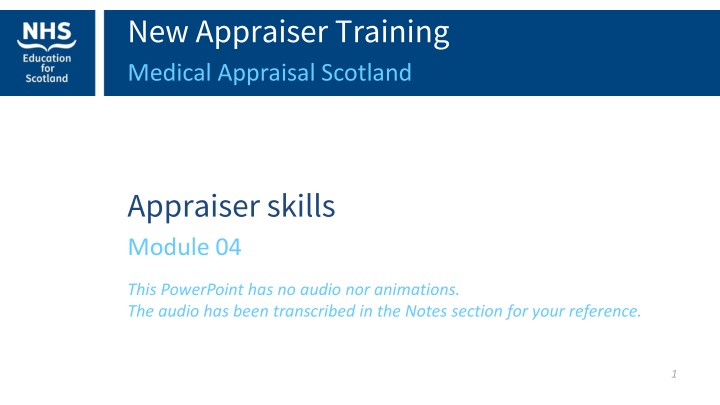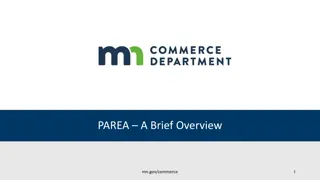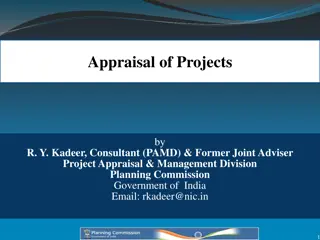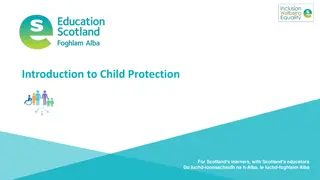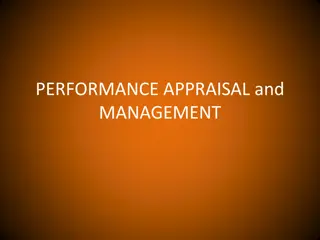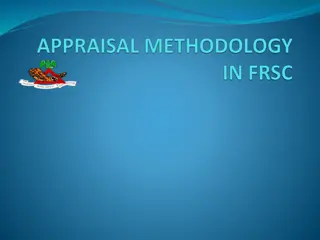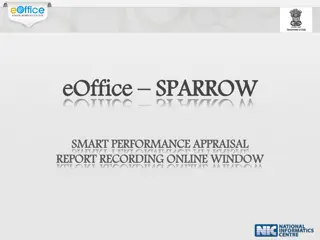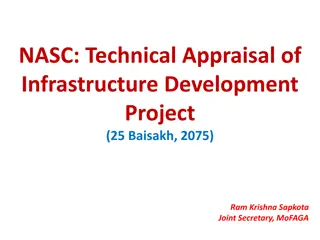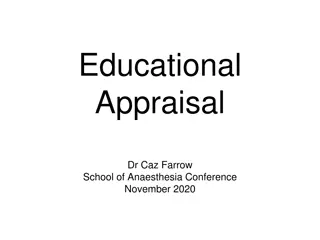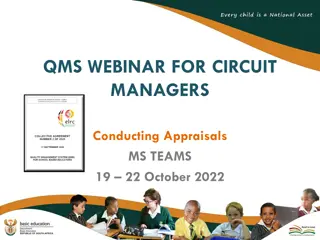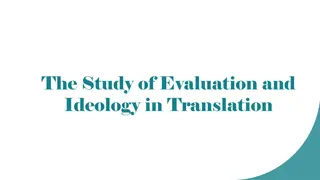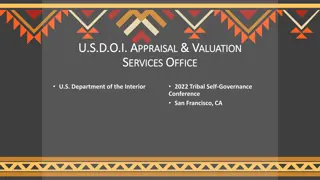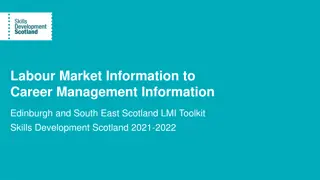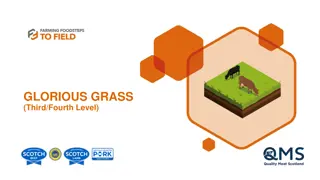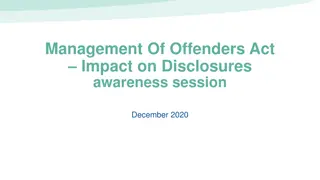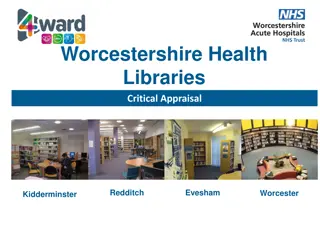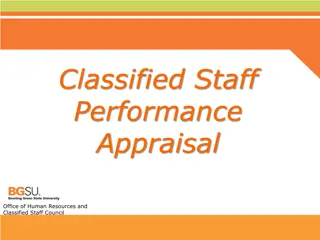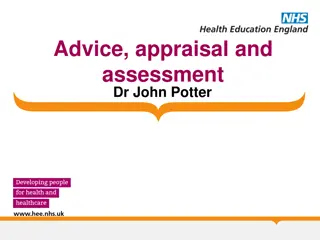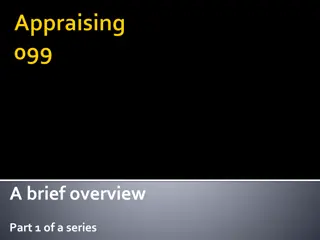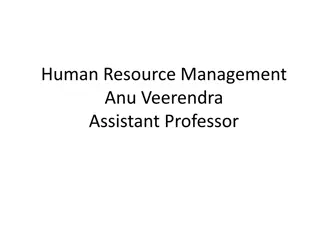Medical Appraisal Skills Training Module in Scotland
This PowerPoint training module focuses on developing appraiser skills within the medical appraisal context in Scotland. It covers topics such as using a coaching approach, handling challenging situations, and the role of feedback in appraisals. The training emphasizes understanding professional judgment, communication skills, and appropriate challenge techniques to support the appraisee effectively. Participants are encouraged to reflect on when and how to apply these skills as an appraiser, considering the qualities of a good appraiser as well.
Download Presentation

Please find below an Image/Link to download the presentation.
The content on the website is provided AS IS for your information and personal use only. It may not be sold, licensed, or shared on other websites without obtaining consent from the author.If you encounter any issues during the download, it is possible that the publisher has removed the file from their server.
You are allowed to download the files provided on this website for personal or commercial use, subject to the condition that they are used lawfully. All files are the property of their respective owners.
The content on the website is provided AS IS for your information and personal use only. It may not be sold, licensed, or shared on other websites without obtaining consent from the author.
E N D
Presentation Transcript
New Appraiser Training Medical Appraisal Scotland Appraiser skills Module 04 This PowerPoint has no audio nor animations. The audio has been transcribed in the Notes section for your reference. 1
NHS Education for Scotland List of Modules Appraisal Overview Supporting Information Personal Development Plan & Introduction to Form 4 Appraiser Skills Using a Coaching Approach in Appraisals Challenging Appraisal Situations Appraisal in Trainer Roles 2
NHS Education for Scotland Aims of this module Approaches and techniques an appraiser can use in an appraisal discussion Judgement Communication skills Feedback 3
NHS Education for Scotland Learning outcomes Understand how to use challenge appropriately in an appraisal that supports the appraisee Understand what professional judgement means in the context of appraisals Understand what communication skills to use in an appraisal discussion Understand the role of feedback in appraisals and be aware of feedback models an appraiser could use 4
NHS Education for Scotland Consider your thoughts on How and when you would use these skills as an appraiser? 5
New Appraiser Training Medical Appraisal Scotland Role of the appraiser 6
NHS Education for Scotland Qualities of a good appraiser Consider: What are the qualities of a good appraiser? Make notes on your thoughts (to be used on training day 1) Group answers under the three headings: knowledge skills attributes Based on Bloom s Taxonomy: Cognitive; Psychomotor; Affective 7
NHS Education for Scotland Role of Appraiser (1/2) Encourage appraisee reflections and solutions only consider offering your own if the appraisee is struggling Be evaluative but avoid an overtly judgmental approach where appraisee feels criticised or labelled Use descriptive language Consider carefully before offering specific advice or making suggestions 8
NHS Education for Scotland Role of Appraiser (2/2) Act as a resource and help appraisee identify areas which could be used for further development Be specific when commenting and offering own view Focus on aspects of appraisee s behaviour which can be changed Structure discussion so that specific outcomes and goals are addressed in each section owned by the appraisee 9
NHS Education for Scotland Video Review https://www.appraisal.nes.scot.nhs.uk/s/videos/pdp2/ Review above video and consider: Is the video a High-Quality appraisal? If yes, what did the appraiser do that you thought was good? If no, why not? How would you have facilitated the discussion? What feedback would you give th appraiser? 10
NHS Education for Scotland Learning and Challenge / Support Support High challenge + High support Low challenge + High support = warm / safe but unsatisfying = optimal learning Challenge Low challenge + Low support High challenge + Low support = safe but unsatisfying and boring = Anxiety provoking / defence response 11
NHS Education for Scotland Comfort / Stretch / Panic Zones stick_man Comfort Zone Stretch Zone Panic Zone 12
NHS Education for Scotland Challenge TrUST model Trust Understanding Safe exploration Task setting goals/actions 13
New Appraiser Training Medical Appraisal Scotland Judgement in appraisal 14
NHS Education for Scotland Judgement? Appraisal supporting information reflects the doctor s scope of work and has been presented in accordance with GMC Guidance Information has been reviewed and summary agreed Appraiser has no reason to believe that the doctor is not practising in line with the principles of Good Medical Practice On track for Revalidation 15
NHS Education for Scotland Professional judgement The equivalent of the clinical judgements that we are all used to making everyday as clinicians (not a judicial process) 16
NHS Education for Scotland What might you need to develop? Professional judgment relating to the doctor s: Engagement Adequate CPD and other Supporting Information Scope of practice Reflection and insight PDP progress and new PDP Progress towards revalidation Patient safety issue or emerging concern 17
NHS Education for Scotland What may need practice? Professional responsibility: to maintain credibility as a medical appraiser Knowledge and understanding: of the appraiser role Communication skills: to facilitate an effective appraisal discussion, produce good quality outputs and to deal with any issues Organisational skills: to ensure the smooth running of the appraisal, including timely responses and sufficient computer skills (covered in Module 1) 18
NHS Education for Scotland Key message 1: First, do no harm The appraisal should be a positive experience for the doctor The effort needs to be proportionate Appraisers must not take on inappropriate roles even if they have the skills 19
NHS Education for Scotland Key message 2: If in doubt ask The doctor being appraised is the expert Supporting information needs to be set in context Appraisers need access to professional support structures including local appraiser meetings and Appraisal Leads Appraisers should have a low threshold for seeking advice (and know the appropriate contact details) 20
New Appraiser Training Medical Appraisal Scotland Communication skills (for appraisal) 21
NHS Education for Scotland Communication Skills for Appraisal (1/2) Listening Skills Open and closed questions Looking for cues verbal/non-verbal Feedback Summarising 22
NHS Education for Scotland Communication Skills for Appraisal (2/2) Acknowledge feelings and be accepting of the person Allow silence Be prepared to challenge Facilitate reflection 23
NHS Education for Scotland Beware of (your) blocking behaviour Closed questions too soon Leading questions Rescuing or problem solving Switching topics Overly task orientated Jollying along Ignoring cues 24
NHS Education for Scotland What communication skills might you use at the appraisal? Some examples: Listening Open questioning Repeating back what they have said Body language for example, mirroring Coaching (and mentoring) skills Motivational interviewing Adult-Adult interaction 25
NHS Education for Scotland Questions, questions Open to funnel Open, probe, re-cap, close Paired (for example, good/bad) Real detail Difficult decisions Stressful events Be inquisitive No assumptions 26
NHS Education for Scotland Practical advice for giving feedback Invite self appraisal and reflection What do you think of the feedback you have received? Start with the positives Let s start with all the positive comments? Be factual Two appraisees last month commented that you seemed to rush the discussion. 27
NHS Education for Scotland Two feedback models to consider Silverman s ALOBA** Agenda Led Outcomes Based Analysis Doctor indicates where they feel they need help and seeks guidance Feedback is driven by the doctor They may not be aware of what is really important Pendleton s rules* Appraiser start with positives, then moves to what might require improvement Provides some emotional credit Can seem false waiting for the negative *Pendleton D, Schofield T, Tate P, Havelock P. The Consultation: An Approach to Learning and Teaching. Oxford: Oxford University Press; 1984. **Silverman JD, Kurtz SM, Draper J.The Calgary-Cambridge approach to communication skills teaching 1: Agenda-led, outcome-based analysis of the consultation. Educ Gen Pract 1996;4:288 299. 28
NHS Education for Scotland Practical advice for giving feedback Be specific not general In fairness, only one patient commented that they felt you did not explain things to them clearly enough Be challenging but not judgemental Several colleagues independently mentioned this. Do you think it might be an issue? 29
NHS Education for Scotland Practical advice to help doctors accept feedback Talk about intention and impression I realize that wasn t your intention, but maybe the impression you created was different Make it seem easy to resolve issues These things often happen to new appraisers. I am sure you can overcome them! 30
NHS Education for Scotland Pendleton s rules (to be used on Day 2 sessions) Clarify any matters of fact The learner describes what they did well The observer(s) describes what was done well The learner describes what could be improved The observer(s) describes what could be improved and offers suggestions on how it could be improved 31
NHS Education for Scotland Pendleton s rules of feedback Appraiser clarifies matters of fact, and prompts Doctor to identify what went well Appraiser highlights observations that confirm what went well, and asks Doctor to discuss what did not go well and how they could improve this aspect of performance Appraiser confirms/refutes doctor s feelings and shares observed areas for improvement Appraiser and doctor agree areas for improvement and formulate an action plan, ending on a positive note 32
NHS Education for Scotland Feedback summary Establish empathy Balance challenge with support Have the evidence: specific examples If resistance is encountered point it out and ask why Review specific incidents in detail Point out patterns of behaviour Don t duck issues: collusion causes problems Allow time out if necessary Negotiate if appropriate 33
NHS Education for Scotland Questions to prompt reflection What went well? What could have been done better? How will this learning/case/experience affect you personally and your practice? How will it improve your patient care and how can you demonstrate that objectively? How can you share this learning with your colleagues? 34
NHS Education for Scotland What kind of appraiser do you want to be? Focus on ticking off all required supporting information is present? Provide feedback on submitted information? Lead the discussion or give doctors the lead? Use a coaching approach? 35
NHS Education for Scotland Further reading Pendelton D, Schofield T, Tate P, Havelock P (1984) The consultation: An approach to Learning and Teaching: Oxford University Press Silverman JD, Kurtz SM, Draper J (1996) The Cagary-Cambridge approach to Communication skills teaching 1: Agenda-led outcome-based analysis of the consultation: Educ Gen Pract Bloom, B. S., Engelhart, M. D., Furst, E. J., Hill, W. H., & Krathwohl, D. R. (1956) Taxonomy of educational objectives: the classification of educational goals; Handbook I: Cognitive Domain New York, Longmans, Green 36
NHS Education for Scotland Next steps Complete other modules Place allocation Microsoft Teams 37
